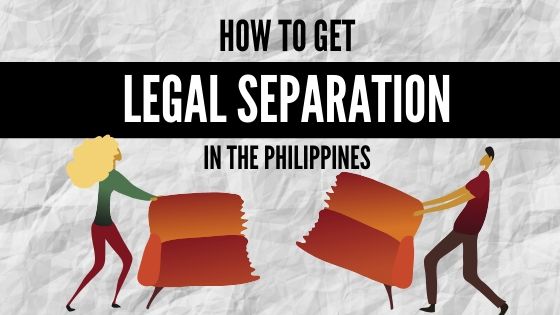How To File a Petition for Legal Separation in the Philippines: An Ultimate Guide

In this article, you’ll learn the process of filing a petition for a legal separation in the Philippines, the grounds for filing such a petition, and what happens next once it’s approved.
DISCLAIMER: This article has been written for general informational purposes only and is not legal advice or a substitute for legal counsel. You should contact your attorney to obtain advice with respect to any particular issue or problem. The use of the information contained herein does not create an attorney-client relationship between the author and the user/reader.
Table of Contents
- Declaration of Nullity or Annulment of Marriage vs. Legal Separation
- What Are the Grounds for Filing a Petition for Legal Separation?
- What Are the Grounds for Your Petition To Be Denied?
- How To File a Petition for Legal Separation in the Philippines: 6 Steps
- Tips and Warnings
- Frequently Asked Questions
- 1. How much does it cost to file a petition for legal separation?
- 2. Can a legally separated person remarry in the Philippines?
- 3. What happens to the couple’s properties after legal separation?
- 4. Who will have custody of the children after legal separation?
- 5. Can legally separated couples reconcile?
- 6. Is legal separation the same as a judicial separation of property?
- 7. What are the grounds for filing a petition for judicial separation of property?
- 8. We’ve already obtained a court decree for legal separation and judicial separation of property. Do I still need to get the consent of my spouse if I want to purchase real property?
- 9. Shall I wait for the grant of my petition for legal separation before I can separate from my spouse?
- 10. I am a battered wife. Can I still file a legal separation even if I am 68 years old? I just want to prevent my husband from selling our properties.
- 11. What is the difference between de facto separation and legal separation?
- 12. I am currently living in the US and I want to file a legal separation against my husband whom I’ve been separated from for more than 3 years. Do I need to file the case in the Philippines or can I do it here in the US?
- 13. I was able to access my wife’s phone and found out she has been cheating on me based on the text messages between her and her highschool classmate. Can I use the text messages on her phone as evidence of her infidelity?
- 14. Is the agreement in the Barangay valid and can be considered legal separation? Is a couple’s separation even under the Barangay jurisdiction?
- Other FAQs
- 15. I am legally married but I and my wife have been separated for 10 years. We do not have a prenuptial agreement. I want to purchase a condominium but I don’t want my wife to be part of it. How can I make it possible?
- 16. I have a pending legal separation case filed by my wife before the Regional Trial Court of Quezon City. I am afraid the court will resolve to grant my wife all the rights to our properties. Can I sell our farm lot during the pendency of the case? I don’t want my wife to have a share of the proceeds of the sale because it was only my money used to purchase the property. We do not have a prenuptial agreement when we got married.
- 17. Can I still file an annulment after my legal separation was granted by the court?
- References
Declaration of Nullity or Annulment of Marriage vs. Legal Separation

Declaration of nullity of marriage applies to marriages that are void from the beginning due to grounds under Art.35, 36, 37, 38 and 53 of the Family Code. Annulment of marriage applies to marriages that are valid from the beginning but are voidable due to grounds under Art. 45 of the same code.
Legal separation, on the other hand, once decreed by the court, entitles the parties to live separately and may be filed on any of the grounds under Art. 55.
The basic difference is that in nullity or annulment, the marriage bond is severed, whereas in a legal separation, marriage still exists, hence, you cannot remarry. Because of this prohibition, legal separation is hardly sought as a remedy.
However, some still choose to file legal separation for various reasons such as religion; the spouse does not want to sever the marriage ties and simply wants to dissolve their property relations; or a favorable decision in legal separation is easier to obtain than in an annulment or nullity, among other reasons.
In this article, I’ll show you the grounds for legal separation, the reasons for your petition to be denied, the steps to take in filing the case, the effects if you reconcile with your spouse, and the property relations including judicial separation of property, among other crucial information.
What Are the Grounds for Filing a Petition for Legal Separation?

Art. 55 of the Family Code provides ten grounds and most of them are straightforward and self-explanatory.
- Repeated physical violence or grossly abusive conduct directed against you or your children.
- Physical violence or moral pressure to compel you to change religious or political affiliation.
- An attempt of your spouse to corrupt or induce you or your children to engage in prostitution, or connivance in such corruption or inducement.
- Final judgment sentencing your spouse to the imprisonment of more than six years, even if pardoned.
- Drug addiction or habitual alcoholism of your spouse which occurred or discovered only after the marriage. If drug addiction or habitual alcoholism exists prior to marriage and was concealed by your spouse, the marriage is voidable pursuant to Art. 46 of the Family Code.
- Lesbianism or homosexuality of your spouse which occurred or discovered only after the marriage. If lesbianism or homosexuality exists prior to marriage and was concealed by your spouse, the marriage is voidable pursuant to Art. 46 of the Family Code
- Contracting by your spouse of a subsequent bigamous marriage, whether in or outside the Philippines. Take note that bigamy is ground for both legal separation and declaration of nullity of marriage. The difference is the person who has the cause of action (the person filing). In a legal separation, the party who has the cause of action is the first marriage (e.g. wife can file legal separation vs. her husband who contracted subsequent marriage). In nullity of marriage, the party who has the cause of action is the second marriage (e.g. the wife of the second marriage can file the case because the second marriage is bigamous and not valid. The first marriage is still valid.)
- Sexual infidelity or perversion of your spouse. The 19th-century medical textbook Psychopathia Sexualis written by Richard von Krafft-Ebing is instructive on what constitutes sexual perversion1 (e.g., sadism, masochism, fetishism, bestiality, sexual inversion in men and women, rape, nymphomania, onanism/masturbation, pedophilia, exhibitionism, necrophilia, and incest). This could be a guide when filing a petition for legal separation based on sexual perversion as a ground.
- Attempt on your life by your spouse.
- Abandonment by your spouse without justifiable cause for more than one year. According to Art. 101, Family Code: “A spouse is deemed to have abandoned the other when he or she has left the conjugal dwelling without intention of returning. The spouse who has left the conjugal dwelling for a period of three months or has failed within the same period to give any information as to his or her whereabouts shall be prima facie presumed to have no intention of returning to the conjugal dwelling.” The wife’s abandonment of the family or leaving the conjugal house due to the husband’s abusive conduct (e.g. violent temper) is considered justified2.
It is noteworthy that the forgoing personality disorders should not be confused with what constitutes psychological incapacity that could be grounds for the declaration of nullity of marriage.
A person’s sexual infidelity or perversion, abandonment, emotional immaturity, and irresponsibility, among others, do not by themselves constitute psychological incapacity within the contemplation of the Family Code.
For it to be considered psychological incapacity, it must be shown that these acts are manifestations of a disordered personality which make the spouse completely unable to discharge the essential obligations of the marital state, not merely due to her youth, immaturity or sexual promiscuity3.
Lastly, ‘unhappiness’, by itself, is not a ground for legal separation. You have to identify what is causing your unhappiness and tailor your petition to ensure your situation covers any of the grounds under Art. 55 of the Family Code.
What Are the Grounds for Your Petition To Be Denied?
Your petition for legal separation shall be denied on the following grounds:
- If you condoned the offense or act complained of or has consented to the commission of the offense. In one case4, the Supreme Court ruled that the act of the husband in persuading the wife to come home despite his belief that his wife committed adultery, the fact that the wife went with him and consented to be brought home and together they slept together as husband and wife – all these facts mean reconciliation between them took place and that there was a condonation of the wife by the husband.
- You connive in the commission of the offense or act constituting the ground for legal separation.
- Both of you have given ground for legal separation. As the saying goes, “he who comes to court must come in clean hands.” Hence, if you are also guilty of the act complained of, your petition will be dismissed.
- There is collusion between you and your spouse to obtain the decree of legal separation. In de Ocampo vs. Florenciano5, collusion in divorce or legal separation means the agreement “between husband and wife for one of them to commit or to appear to commit, or to be represented in court as having committed, a matrimonial offense, or to suppress evidence of a valid defense, for the purpose of enabling the other to obtain a divorce. This agreement, if not express, may be implied from the acts of the parties.” In other words, both parties can’t agree on the legal separation otherwise their petition will be dismissed on grounds of collusion between parties.
- The action is barred by prescription, that is, if you file the case after five years from the occurrence of the act complained of, your case will also not prosper.
How To File a Petition for Legal Separation in the Philippines: 6 Steps

1. Engage the services of a lawyer
Similar to the process of filling a declaration of nullity or annulment of marriage, you have to engage the services of the lawyer first. If you’re wondering about the expenses/fees, here’s a breakdown of the cost of filing for a legal separation in the Philippines.
2. For the Lawyer: Prepare the petition and file the case in court
Your lawyer will draft the petition which shall contain the following:
- Allegation of the complete facts constituting your cause of action;
- Names and ages of your common children;
- The regime governing your property relations, properties involved and list of your creditors, if any;
- Unless otherwise previously agreed, your petition may also contain an application for temporary spousal support (alimony), custody and support of common children, visitation rights, administration of your properties, among others.
The petition shall be filed in court in six copies furnishing a copy thereof to the City or Provincial Prosecutor and to the creditors, if any, within five days from its filing in court and submitting the proof of service within the same period.
Failure to comply with these requirements may be a ground for the immediate dismissal of your petition.
The petition can only be filed by the husband or the wife and cannot be filed by the children or inlaws.
You should file your petition within 5 years from the occurrence of the ground in the Regional Trial Court of the province or city where you or your spouse has been residing for at least six months prior to the date of the filing of your case. The rule on the venue is the same as with filing a declaration of nullity or annulment of marriage.
Art. 58 of the Family Code provides that no action for legal separation shall be tried before six months shall have elapsed since the filing of the petition. The six months cooling-off period is mandatory to give you and your spouse a chance for reconciliation.
Please note that the court will not grant your legal separation unless it has taken steps towards your reconciliation. Once the court is satisfied that reconciliation is impossible, the decree shall then be issued.
3. For the Clerk of Court: Raffle the case and issue the summons
The case will be raffled to the Family Court of the Regional Trial Court where the petition is filed.
The summons will then be issued by the RTC directing your spouse to answer the petition within fifteen (15) days from receipt of the order.
If you do not know the whereabouts of your spouse, service of summons may be done through publication once a week for two consecutive weeks in a newspaper of general circulation in the Philippines. It will also be served on his last known address by registered mail or other sufficient means.
If your spouse did not file his answer or filed an answer but failed to tender an issue, the court shall order the public prosecutor to investigate if collusion exists between you and your spouse.
Before the pre-trial proceedings or at any stage of the case, the Court may require a social worker to conduct a case study.
4. Attend the pre-trial proceedings
Pre-trial is mandatory and failure to attend the pre-trial will cause the dismissal of your case.
In case you cannot attend the Pre-trial because of some valid grounds (e.g., you are abroad), your lawyer or any authorized representative should attend instead and present your valid excuse before the court.
5. Go through the actual trial
During this stage, you will need to present all your evidence and witnesses to prove your case including personally sitting in the witness stand to testify. It is advisable to present additional witnesses who personally know your marital relationship so that your statement will be corroborated.
Please note that your ground for legal separation must be proven by evidence. The court will not grant your petition by simply submission of pleadings, summary judgment, or confession of judgment.
Confession of judgment happens when the other party appears in court and confesses the right of the complainant to judgment or files a pleading expressly agreeing to the complainant’s demand.
6. Wait for the judgment
The period of time before you can get the decision depends heavily on several factors such as the nature of your case, the availability of your witnesses, the schedule of the court, unforeseen events like postponements due to sickness or weather.
It will also matter on the timeline when your spouse is contesting your petition; when properties and custody of children are involved; or if the Solicitor General appeals the case. The cooling-off period of six months also adds to the length of time before the decision is obtained.
Tips and Warnings
- Sexual intercourse after knowledge of the infidelity of the spouse is an implied condonation, hence it will be a ground for the denial of your petition.
- Legal separation is usually a highly contested case because once the spouse is adjudged as the guilty party, the net profits of all their common properties will be forfeited in favor of the children, if none, to the innocent spouse.
- In the judicial separation of property, you and your spouse may still live together under one roof as what is separated is only your properties.
- If the wife has been using the surname of her husband, she can not revert to her maiden name even after the decree of legal separation is granted, except if there is a judicial authority allowing her to use her maiden name (Art 372, 376, Civil Code of the Philippines).
Frequently Asked Questions
1. How much does it cost to file a petition for legal separation?
2. Can a legally separated person remarry in the Philippines?
3. What happens to the couple’s properties after legal separation?
4. Who will have custody of the children after legal separation?
5. Can legally separated couples reconcile?
6. Is legal separation the same as a judicial separation of property?
7. What are the grounds for filing a petition for judicial separation of property?
8. We’ve already obtained a court decree for legal separation and judicial separation of property. Do I still need to get the consent of my spouse if I want to purchase real property?
9. Shall I wait for the grant of my petition for legal separation before I can separate from my spouse?
10. I am a battered wife. Can I still file a legal separation even if I am 68 years old? I just want to prevent my husband from selling our properties.
11. What is the difference between de facto separation and legal separation?
12. I am currently living in the US and I want to file a legal separation against my husband whom I’ve been separated from for more than 3 years. Do I need to file the case in the Philippines or can I do it here in the US?
13. I was able to access my wife’s phone and found out she has been cheating on me based on the text messages between her and her highschool classmate. Can I use the text messages on her phone as evidence of her infidelity?
14. Is the agreement in the Barangay valid and can be considered legal separation? Is a couple’s separation even under the Barangay jurisdiction?
Other FAQs
15. I am legally married but I and my wife have been separated for 10 years. We do not have a prenuptial agreement. I want to purchase a condominium but I don’t want my wife to be part of it. How can I make it possible?
All properties purchased during your marriage are presumed to be included in your conjugal properties absent any regime prior to entering into marriage even if you have been separated for 10 years (Art. 93, Family Code).
Separation of properties during your marriage can not be possible without a judicial order. You either have to file legal separation or a judicial separation of property in accordance with Art 134 and 35 of the Family Code.
16. I have a pending legal separation case filed by my wife before the Regional Trial Court of Quezon City. I am afraid the court will resolve to grant my wife all the rights to our properties. Can I sell our farm lot during the pendency of the case? I don’t want my wife to have a share of the proceeds of the sale because it was only my money used to purchase the property. We do not have a prenuptial agreement when we got married.
The property cannot be sold without the consent of your wife. In an absolute community, all properties acquired during the marriage are presumed to be conjugal unless it is one of those expressly excluded by law.
In one case6, the court invalidated the sale of a conjugal house which was sold by the husband during the pendency of a legal separation case. The court ruled that the husband has no authority to sell a conjugal property without the consent of the wife.
The buyer was also adjudged as a buyer in bad faith for failing to exercise due diligence before purchasing the subject property.
17. Can I still file an annulment after my legal separation was granted by the court?
Yes, you still can. Annulment or nullity cases have different causes of action or different grounds. The filing of one case does not exclude the other.
References
- Sexual Perversion | Encyclopedia.com. (2019). Retrieved 4 January 2020, from https://www.encyclopedia.com/social-sciences/encyclopedias-almanacs-transcripts-and-maps/sexual-perversion
- Ong Eng Kiam a.k.a. William Ong v. Lucita G. Ong, G.R. NO. 153206 http://www.chanrobles.com/scdecisions/jurisprudence2006/oct2006/gr_153206_2006.php (Supreme Court of the Philippines 2006).
- David Dedel v. Court of Appeals and Sharon Corpuz-Dedel, G.R. No. 151867 https://www.lawphil.net/judjuris/juri2004/jan2004/gr_151867_2004.html (Supreme Court of the Philippines 2004).
- Benjamin Bugayong v. Leonila Ginez, G.R. No. L-10033 https://www.lawphil.net/judjuris/juri1956/dec1956/gr_l-10033_1956.html (Supreme Court of the Philippines 1956).
- Jose de Ocampo v. Serafina Florenciano, G.R. No. L-13553 http://www.chanrobles.com/scdecisions/jurisprudence1960/feb1960/gr_l-13553_1960.php (Supreme Court of the Philippines 1960).
- Josefina Nobleza v. Shirley Nuega, G.R. No. 193038 http://www.chanrobles.com/cralaw/2015marchdecisions.php?id=317 (Supreme Court of the Philippines 2015).
Written by Atty. Kareen Lucero
Atty. Kareen Lucero
Kareen Lucero is a lawyer previously doing litigation before working for different agencies in the government and for a multinational corporation. She has traveled to 52+ countries including a 3-month solo backpacking in South East Asia and more than 1 year of solo traveling across four continents in the world. As part of giving back, she is passionate about sharing her knowledge of law and travel. She is currently doing consulting work for a government agency. For inquiries, you may reach her via Facebook Messenger (https://m.me/kareen.lucero.77) or email ([email protected]).
Copyright Notice
All materials contained on this site are protected by the Republic of the Philippines copyright law and may not be reproduced, distributed, transmitted, displayed, published, or broadcast without the prior written permission of filipiknow.net or in the case of third party materials, the owner of that content. You may not alter or remove any trademark, copyright, or other notice from copies of the content. Be warned that we have already reported and helped terminate several websites and YouTube channels for blatantly stealing our content. If you wish to use filipiknow.net content for commercial purposes, such as for content syndication, etc., please contact us at legal(at)filipiknow(dot)net